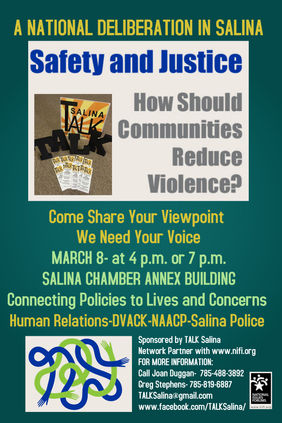
SALINA'S PATCHWORK OF COMMUNITY CONVERSATIONS
Salina's Social Capacity for Conversations

HOW IT WORKS
The Steps to Hosting a TALK Salina Deliberation
Step 1: Selecting a Topic
We prefer to partner with a collaborating organization when we host a public deliberation.
The subject selected is on a topic the collaborating organization and community have an interest, It can be a local, state or national issue.
Topics usually are those difficult or complex issues that do not have easy technical solutions and are on issues where people often have differing views.
The topics we choose usually have three different options available and are NOT"yes" or "no" options/decisions.
Step 2: Researching the Topic
If the topic is on a national issue, we check with the National Issues Forum to determine if they have already developed a discussion guidebook. If they have one, we localize the content if needed.
On local topics, we conduct interviews with citizens from different perspectives and develop a local guidebook that contains three different options for discussion.
Guidebooks, whether provided by NIF) or developed locally may incur a nominal printing cost.
Step 3: Planning the Event
Hosting an event is simple. A date and location for the event is selected.
The facility selected should be large enough for the anticipated number of attendees. Round tables are preferred, but rectangular tables will work too.
The event can be hosted once, or multiple times.
Then we notify our volunteer facilitators. We prefer 4 to 8 persons at each roundtable for the discussion. If it is possible to compensate volunteers with a nominal fee they appreciate this but volunteers are available if we are unable to budget for table facilitators.
Finally, it is necessary to market the event. Collaborating organizations usually provide outreach within their groups. Other supporting organizations are encouraged to share and invite. And TALK Salina has a system for marketing as well as regular discussion attendees. Our marketing efforts include word-of-mouth, postering, news releases, social media and targeted outreach.
Step 4: Hosting the Event
On the date of the event, we arrive early and set up. We prefer to have available light snacks and drinks (coffee, water, soft) for attendees.
At the start, the moderator convenes the event with a welcome, overview of the evening, rules for civic discussion, and a short introductory or individual comments by guest panelists to introduce the topic.
Then each facilitator starts with table introductions and a notetaker is selected at each table who records as many comments and stories as possible. Then the discussion begins on the first of three options. Each option is allowed 20 minutes. At the end of the third option discussed, another 10-15 minutes is allowed to summarize the options and determine the tensions and overlapping agreements discussed at each table.
The event ends with table reports which are also outlined on wall notepaper so everyone can see results from other tables. If preferred, after all table reports, the attendees are given dots to past on the outline as they select the comments and results they preferred as a whole. Finally, a survey is given to everyone to fill out at the end of the evening.
Step 5: After the Event
After the event has ended, the information is compiled by
TALK Salina organizers into a written report and made available to those attending and to the collaborating organization. The written surveys are also forwarded to the Kettering Foundation if one of their guidebooks was used at the event.
What Does This All Cost?
We have a modest budget managed by Central Kansas District Extension. TALK Salina facilitators are a volunteer network but we like to compensate our facilitators with a modest fee when possible (from $25 to $50). TALK Salina often pursues grants to cover costs. These have been as low as $100 to more than $1,500
If your organization wants to explore collaborating on an event or issue of interest, CONTACT US to talk about topic, availability, and cost.
SUPPORTERS
FACILITATORS
Founding Supporters of TALK Salina
Salina has a great patchwork of organizations offering community conversations, discussions, information, and insights.
Here are the founding supporters for TALK Salina.
Kansas State University Polytechnic
Central Kansas District Extension
Salina Area Chamber of Commerce
Saline County Young Professionals
League of Women Voters of Salina
We welcome and encourage all organizations to join the patchwork!
If your group wants to be added to this list, contact TALKSalina@gmail.com or call 785-819-6887.
This alphabetical list includes everyone who has participated in facilitation training. We will continue to include new facilitators on this list. Not all facilitators are active and some have moved out of the area.
Dr. Phil Black
Dee Boyd
Debora Cox
Kaye Crawford
Rodney Denholm
Joan Duggan
Taylor Eddy
Maribel Garcia Cerna
Carl Garten
Luis Gonzalez
Barb Goode
Brenda Gutierrez
Bill Hall
Janet Hansen
Jalena Hood
Dr. Mark Jackson
Nancy Klostermeyer
Deb Marseline
Gary Martens
Joe McKenzie
Lanay Meyer
Patrick Milhan
Cynthia Nelson
Gina Nelson-Fishel
Thea Nietfeld
Lowell Moore
David Norlin
Joan Ratzlaff
Tissa Salter
Greg Stephens
Trillian Svoboda
Gary Swartzendruber
Courtney Train
Tamara Trepoy
Kimberly Trigg
Carol Viar
Jamie Womochel
Norma Wright
Ann Zimmerman








